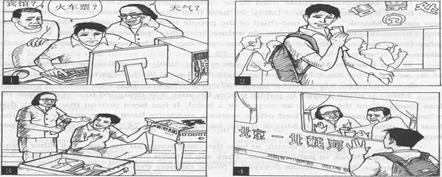
题目列表(包括答案和解析)
第II卷(共35分)
第四部分:书面表达(共两节,35分)
第一节 情景作文(20分)
最近,你校学生会对分类垃圾箱是否进教室一事进行了调查,调查结果见下表。请根据图表提供的信息用英语写一篇短文,介绍同学们的不同意见和看法,并表达你自己的观点。
注意:词数不少于60。
提示词:饼状图pie chart
学生对分类垃圾箱进教室的不同看法及所占比例

第四部分:书面表达(共两节,35分)第一节情景作文(20分)
假设你是红星中学高二(1)班的学生李华,利用上周末的时间帮助祖父母安排了去北戴河的旅行。请根据以下四幅图的先后顺序,写一篇英文周记,叙述你从准备到送行的全过程。
注意:1.周记的开头已为你写好。
2.词数不少于60。
Last weekend, I helped my grandparents prepare their trip to Beidaihe.__________________________________
_____________________________________________________________________________________________________________________________________________
第二卷(两部分,共35分)
第四部分:书面表达 (共两节,35分)
第一节情景作文 (20分)
三年的高中即将结束。请你以“I will remember my school life forever”为题,为英语校刊投稿。
注意:文章应包括下面四幅图的内容
词数不少于60。
文章的开头已为你写出。
After the College Entrance Examination, the three-year school life will come to an end. It’s hard to say goodbye to my school, teachers and friends, because I have an unforgettable time here.
第一节 情景作文(20分)
假设你是李华,要给英国笔友Harry写封信,介绍你班两位同学竞选班长的过程。请按下图顺序描述。
注意:1.信的开头已为你写好。
.2.词数不少于60。
提示词:竞选班长monitor election

Dear Harry,
How are things going?
Last Monday,(请将情景作文写在答题卡Ⅱ第一页指定区域内)
Best wishes,
Li Hua
.
第二部分:阅读理解(共两节,满分50分)
第一节(共20小题,每小题2分,满分40分)阅读下列短文,从每题所给的四个选项A、B、C、D中选出最佳选项。
Judging from recent surveys, most experts in sleep behaviour agree that there is virtually an epidemic (流行病)of sleepiness in the nation. “I can’t think of a single study that hasn’t found Americans getting less sleep than they ought to,” says Dr. David. Even people who think they are sleeping enough would probably be better off with more rest.
The beginning of our sleep-deficit crises can be traced back to the invention of the light bulb a century ago. From diary entries and our personal accounts from the 18th and 19th centuries, sleep scientists have reached the conclusion that the average person used to sleep about 9. 5 hours a night. “The best sleep habits once were forced on us, when we had nothing to do in the evening down on the farm, and it was dark.” By the 1950s and 1960s, the sleep schedule had been reduced dramatically, to between 7. 5 and 8 hours, and most people had to wake to an alarm clock. “People cheat in their sleep, and they don’t even realize they’re doing it,” says Dr. David. “They think they’re okey because they can get by on 6. 5 hours, when they really need 7. 5, 8 or even more to feel ideally energetic. ”
Perhaps the most merciless robber of sleep, researches say, is the complexity of the day. Whenever pressures from work, family, friends and community increase, many people consider sleep the least expensive item on their programme. “In our society, you’re considered dynamic if you say you need only 5. 5 hours’ sleep. If you’ve got to get 8. 5 hours, people think you lack drive and ambition. ”
To determine the consequences of sleep-deficit, researchers have put subjects through a set of psychological and performance tests requiting them, for instance, to add columns of numbers or recall a passage read to them only minutes earlier. “We’ve found that if you’re in sleep deficit, performance suffers,” says Dr. David. “Short-term memory is weakened, as are abilities to make decisions and to concentrate. ”
41. What is the main topic of the passage?
A. Research on the causes and consequences of sleep-deficit.
B. The epidemic of sleepiness in the modern times.
C. The history of people’s sleeping patterns.
D. The minimum of our sleeping hours.
42. Which of the following is Dr. David’s opinion?
A. People who think they are sleeping enough are better off than those who don't.
B. Some people can remain energetic with only 6. 5 hours’ sleep a night.
C. If they get 8. 5 hours’ sleep, people will be full of drive and ambition.
D. People’s metal power suffers if they are lacking in sleep.
43. People in the 18th and 19th centuries slept about 9. 5 hours a night because _______.
A. they were forced by their parents to do so
B. they knew what was best for their health
C. they had no electricity
D. they were not so dynamic and ambitious as modern people are
44. What does the word “subjects” in paragraph 4 mean?
A. Persons or things being discussed or described.
B. Branches of knowledge studied in a school.
C. Persons or things being treated in a certain way or being experimented on.
D. Any member of a state apart from the the supreme ruler.
湖北省互联网违法和不良信息举报平台 | 网上有害信息举报专区 | 电信诈骗举报专区 | 涉历史虚无主义有害信息举报专区 | 涉企侵权举报专区
违法和不良信息举报电话:027-86699610 举报邮箱:58377363@163.com